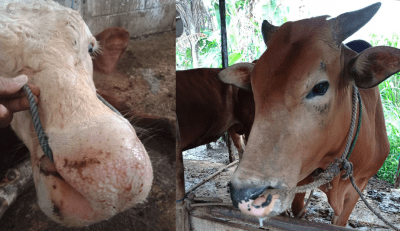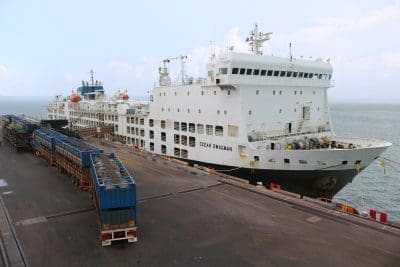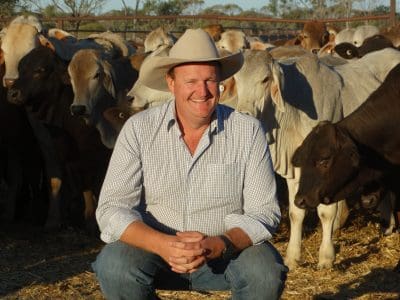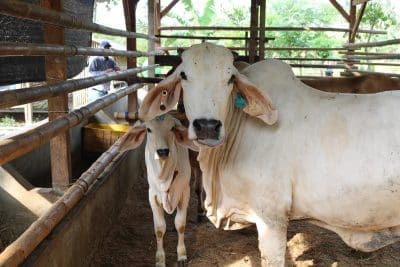IT is almost 80 days since Foot and Mouth Disease was confirmed in Indonesia, but vaccinations have only started in the last two weeks.
Australia is relying heavily on Indonesia’s ability to control outbreaks of lumpy skin disease and foot and mouth disease to prevent future incursions here.
 On current evidence control remains a long way from being achieved in both outbreaks, while eradication and disease-freedom will be at least some years away, at best.
On current evidence control remains a long way from being achieved in both outbreaks, while eradication and disease-freedom will be at least some years away, at best.
Indonesia has 65 million susceptible animals (that is cattle, sheep, goats, pigs and buffalo), a Northern Territory Government webinar this morning was told.
Only about 450,000 doses of FMD vaccine have been distributed so far.
Another 2.5 million doses are still in refrigerated storage and are yet to be administered.
Several more million doses have been committed from countries like Australia and commercial manufacturers.
While the vaccination program was starting slowly, the Qurban or Eid al-Adha religious festival from July 9 to 12 resulted in large movements of animals around the country, which is also considered likely to have promoted the further spread of the diseases.
LSD focus stalls
Two months before foot and mouth disease reoccurred in Indonesia, an outbreak of lumpy skin livestock disease was reported in the country.
It may have disappeared from headlines as FMD has dominated attention, but the disease hasn’t gone away, and still represents a major animal welfare and economic threat to Australia’s livestock sector.
LSD is still spreading throughout Indonesia but little is happening in terms of vaccination, with access to commercial vaccines still not yet available.
Beef Central this week asked CPC CEO Troy Setter who has just returned from a regular visit to Indonesia for an update on the FMD and LSD situation.
He said one of the issues that separates Indonesia from other countries that have FMD and LSD is the uncontrolled nature of the current outbreaks in Indonesia.
Where Vietnam, China and many other countries have FMD, by and large they mostly have them under control with vaccination, and manage minor flare ups as they occur.
By contrast Indonesia was still in the growing and spreading phase, rather than the control phase.
FMD spreading at very fast speed
Mr Setter said FMD is still spreading through the local cattle herd in Indonesia at “a very fast speed”, with reports of significant loss of dairy cattle and production in particular.
“On the local cattle front we’re still seeing significant numbers that aren’t market ready or are breeder cattle that are mildly infected with FMD being brought to market or people selling them quickly before they get FMD because they are scared about getting infected.”
That was in effect promoting the further spread of the disease.
Feedlots desperate for vaccines
Importers of Australian cattle are desperately awaiting access to vaccines.
“Then there are the feedlots that import Australian cattle – there is anecdotal reports that a significant number of them have FMD, and what we have seen is a drop off of confidence from the feedlots in Indonesia to import Australian cattle during June and July.
“Some of the feedlots are able to get vaccines through Government programs, or the government distribution of vaccines and that is pleasing, and then there is certainly big orders of vaccine being placed by the feedlots.
“If they can get those in July or August that will improve confidence and allow many of them to start importing again, but at the moment until they get enough vaccine for the treatment of Australian cattle, a lot of them don’t have confidence to continue to import.”
Effect of FMD on shipping trade expected in July data
 Official trade data released on Friday showed that cattle shipments to Indonesia dropped from 35,762 head in May to 25,730 head in June.
Official trade data released on Friday showed that cattle shipments to Indonesia dropped from 35,762 head in May to 25,730 head in June.
Many of the cattle shipped in June were from orders placed in April and early May before news of the FMD outbreak in Indonesia had been reported.
The true impact of the FMD outbreak on shipments to Indonesia is expected to be visible when the figures for the current month of July are available.
Asked if he was aware of existing orders for Australian cattle being cancelled by Indonesian importers as a result of the FMD outbreak, Mr Setter said he had not heard of that happening.
“But I have certainly heard or seen either a delay of shipments or people not signing up new shipments,” he said.
“It is really that vaccination program that is so crucial now.”
CPC ramping up biosecurity
“We have made massive enhancements to our biosecurity at both of our feedlots in Indonesia and we have been able to keep FMD and LSD out of our feedlots,” Mr Setter said.
“We have been able to access some FMD vaccine through Indonesian Government programs and our team has supported the vaccination of over 8,000 local cattle for FMD around our feedlots.”
Control ‘long way off’
With around 450,000 vaccinated out of an at-risk population of more than 65 million livestock, and booster shots also needed to achieve effective treatment, control of FMD in Indonesia was a still “very, very long way” off being achieved, he said.
Indonesia still had aspirations to eradicate FMD, but that would be several years away at best.
“In reality it is going to take several years to get FMD under control and then it will take several more years for Indonesia to be classed as eradicated and free from FMD.”
Mr Setter spent time with new agriculture minister Murray Watt in Indonesia last week and said he believed the new Australian Government was taking the right approach offering support to Indonesia. The Australian government is giving FMD and LSD vaccines as well as technical support.
“Implementation of vaccines and support is a real challenge, you have got to remember there are 270 million people and 15,000 islands, it is very hard.
“I think if we had a widespread outbreak in Australia where FMD and or LSD was spread widely and quickly, we would have some challenges as well getting vaccines rolled out, movement restriction implemented, state governments working with federal governments and local councils and other industries that are impacted, it would not necessarily be smooth sailing here either.”
Mr Setter said market reports suggested LSD is spreading through Indonesia, and, while some documentation for permits is closer to being approved, feedlots were still unable to access commercially available vaccines yet.
He said Australian cattle producers should consider their own level of preparation for a potential incursion in Australia, but also “practice that preparedness”.
Further information on what producers can do can be found on websites such as Meat and Livestock Australia, Farm Biosecurity or the Department of Agriculture.



HAVE YOUR SAY